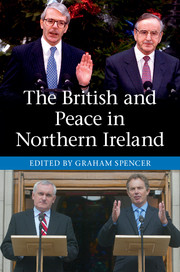Book contents
- Frontmatter
- Dedication
- Contents
- Notes on contributors
- Acknowledgements
- Brief chronology of the peace process
- Abbreviations
- Key documents
- Introduction
- 1 The terrain of discourse
- 2 The Anglo-Irish Agreement: an interview with Sir David Goodall and Lord Armstrong of Ilminster
- 3 The constitutional issue in Irish politics
- 4 Negotiations and positions: an interview with Sir John Chilcot
- 5 Resolving intercommunal conflict: some enabling factors
- 6 Tactics, strategy and space
- 7 The Joint Declaration and memory
- 8 Movement and transition in 1997: Major to Blair
- 9 The challenge of symmetry in dialogue: an interview with Sir Joseph Pilling
- 10 Why was the Good Friday Agreement so hard to implement?: lessons from ‘Groundhog Day’, 1998–2002
- 11 Text and context: an interview with William Fittall
- 12 The nature of dialogue: an interview with Sir Jonathan Phillips
- 13 Managing the tensions of difference: an interview with Jonathan Powell
- Conclusion
- Index
8 - Movement and transition in 1997: Major to Blair
Published online by Cambridge University Press: 05 March 2015
- Frontmatter
- Dedication
- Contents
- Notes on contributors
- Acknowledgements
- Brief chronology of the peace process
- Abbreviations
- Key documents
- Introduction
- 1 The terrain of discourse
- 2 The Anglo-Irish Agreement: an interview with Sir David Goodall and Lord Armstrong of Ilminster
- 3 The constitutional issue in Irish politics
- 4 Negotiations and positions: an interview with Sir John Chilcot
- 5 Resolving intercommunal conflict: some enabling factors
- 6 Tactics, strategy and space
- 7 The Joint Declaration and memory
- 8 Movement and transition in 1997: Major to Blair
- 9 The challenge of symmetry in dialogue: an interview with Sir Joseph Pilling
- 10 Why was the Good Friday Agreement so hard to implement?: lessons from ‘Groundhog Day’, 1998–2002
- 11 Text and context: an interview with William Fittall
- 12 The nature of dialogue: an interview with Sir Jonathan Phillips
- 13 Managing the tensions of difference: an interview with Jonathan Powell
- Conclusion
- Index
Summary
My aim in this chapter is to describe the transition between John Major and Tony Blair in the area of Northern Ireland policy, from the perspective of someone who lived through it at close quarters. What stayed the same, and what was different? Why was Blair able to take what Major had started through to a successful conclusion? Did they have different views, or was it just their political circumstances that were different? These are questions that I will consider and elaborate on, but, before I do so, it is important to provide some background context to political conditions at the early stages of the peace process and the influences on the process.
The Downing Street context
I took over from Rod Lyne as John Major's overseas adviser at the beginning of 1996. The role was wide-ranging, covering all international and defence affairs, including overseas aid, and was all-consuming. There was little substantive policy support for the role in 10 Downing Street at that stage, although the administrative back-up was formidable. While there was advice to be had in some areas from the Cabinet Office Overseas and Defence Secretariat, I had only one Foreign Office assistant of my own to help me cover everything going on in the world. Even that was a relative novelty – my predecessors until Rod Lyne had had no such help, reflecting the then prevailing wisdom that Number 10 advisers should essentially be intelligent links between the prime minister and his ministries rather than independent sources of advice and policy expertise. All this may seem rather quaint in the age of a National Security Council, and it no longer quite represented the reality even then (think of Charles Powell's role with Mrs Thatcher). But the sensible idea behind it was to stop overweening and overambitious prime ministerial advisers second-guessing line departments and ministers or, even worse, developing rival policies, as was seen to be the damaging case in Washington, with the national security advisor constantly at the elbow of the president, backed by the resources of their National Security Council, and vying counter-productively with the State Department and the Pentagon for influence.
- Type
- Chapter
- Information
- The British and Peace in Northern IrelandThe Process and Practice of Reaching Agreement, pp. 177 - 200Publisher: Cambridge University PressPrint publication year: 2015



